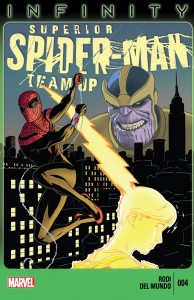 Superior Spider-Man Team-Up #4 had some interesting things to say socially and culturally, but I have some serious questions about whether or not it was actually a “good” Spider-Man comic.
Superior Spider-Man Team-Up #4 had some interesting things to say socially and culturally, but I have some serious questions about whether or not it was actually a “good” Spider-Man comic.
I tend not to get caught up in this idea that there’s a certain way for creators to “do Spider-Man.” I think as fans, if we clutch too tightly to some kind of defined style and tone, we potentially rob ourselves of the opportunity to enjoy some really amazing stories. Take Peter David’s “Death of Jean Dewolff” arc for example. Many Spidey fans consider it their favorite story of all-time, but when it was first published, it was dramatically different tonally from any other Spider-Man book that preceded it. More recently, I noted that Matt Kindt’s take on Spidey in his Marvel Knights mini was very unique – and I found myself enjoying it immensely.
But there was something about this two-part Superior Team-Up arc by Rob Rodi and Mike del Mundo that was “different” in a way that I didn’t enjoy. In my write-up on the first part of this arc, I talked about the unnecessary Infinity tie-in that took away from the quirky team-up element that I thought was going to be the focal point of a series called Superior Spider-Man Team-Up. While there was still some Infinity references in Superior Team-Up #4, I realized that my problem with this story went beyond the shoe-horning of a major Marvel event into some random comic title. Basically, as a reader, you sometimes just have to listen to your gut, and for me, my gut was telling me this just didn’t “feel” like a “true” Spider-Man tale.
That’s not to say that the larger social message found in the text of the comic wasn’t an interesting one. The debate between Spider Ock and Fulmina, the young academic-turned-force of electric nature, regarding the value of the past’s simplicity versus the aggression of the technology-centric present/future is something I would expect to find in an Iron Man comic. But Spider-Man? While I fully realize that Otto Octavius is a man of science and would naturally value the advancements of the modern world over the regressive nature of the Middle Ages, I just don’t know if I needed an entire Spider-Man comic dedicated to the argument. Especially when the backdrop for this story is an alien invasion led by Thanos’ army.
Personally, while I always tend to side with science, there is something to be said about Fulmina’s point about becoming slaves to our advancing technology. Otto’s interpretation of the Middle Ages as being a completely backwards time overrun with stupidity, slavery and disease, is undoubtedly a glib over-simplification of an era commonly known as the “Dark Ages.” I think we, as a society, tend to ignore our cultural ties to the past, and I think it’s a shame when someone dedicates their academic life to studying something like the Cantebury Tales that her efforts can be dismissed as being useless or antiquated. There needs to be a combination of past and present in how we approach our lives – which is what I think Rodi was going for in the ending of the book when Fulmina uses her new-found power to destroy the intergalactic armada attacking Earth.
The problem with everything I just wrote is that I’m probably giving this comic a bit of an over-read because of my own academic background and personal interest in the vitality of classic texts. From a sheer one-and-done (or two-and-done) comic book story narrative, I didn’t get the usual action, adventure and perhaps most importantly, a legitimate Spider-Man superhero team-up that I’ve come to expect from this series. Having Otto talk about Fulmina being his protégé at the end is not enough of a plot development to make this book a “team-up” story. Whatever happened to Spider-Man pairing off with the random hero du jour, whether it be Captain America, or Adam Warlock, and having some fun fighting (usually) some other character’s villain?
Even more troubling, the story’s lack of familiarity took me so far out of the book, I wasn’t even remotely interested in the reappearance of Doc Ock’s mind helmet, which we last saw in Superior Spider-Man #9 during the infamous Parker-ecthomy.
As a result, this Rodi/del Mundo story sticks out like a sore thumb even within a series that’s been grossly inconsistent since the launch of the “Superior” era earlier this year. I’ve enjoyed a couple of these issues, but still find myself struggling to simply summarize exactly what Team-Up/Avenging is supposed to be about. When Avenging was first launched in 2011, the central thesis of the series was very straightforward: isolated Spider-Man team-up stories with assorted members of the Avengers. Now it’s a jumbled mess of face-offs with characters like Kaine, Marvel event tie-ins and philosophical debates about the meaning of culture.
The next major arc will focus more on the assorted members of the Sinister Six Spider Ock has been collecting (it also brings Chris Yost back to the writing fold), so I guess this will maybe help the series become more consistent. But considering how Avenging ended and how the first four issues of Team-Up have gone, I have to hedge my expectations a bit until the creative team can deliver a focused Spider-Man story for more than one or two issues. If it sounds like I’m subscribing to the (former Spider-Man editor) Jim Owsley school of thought that different Spidey books warrant different tones and focuses (a mandate that gave us “Death of Jean DeWolff,” let me just clarify that by saying, I would also take the Jim Salicrup “unified” approach to the Spider books as well.
The bottom line is that there needs to be consistency with this series so I know when I pick up an issue of Team-Up every month, I don’t question whether or not I’m reading a story that has some semblance of a vision guiding it. That’s why even when I’m unhappy with parts of a Dan Slott Superior story, I still appreciate the series as a whole because Slott obviously has a vision that doesn’t waver from deadline to deadline. As a starting point, I think it’s time Marvel’s creative forces sit down and determine what it is they exactly want out of a Spider-Man “B” title beyond the $4 from hardcore fans like me who are too pigheaded to ignore a title that seemingly doesn’t want to define itself in any meaningful kind of way within the Spider-Man universe.
All images from Superior Spider-Man Team-Up #4: Rob Rodi and Michael del Mundo

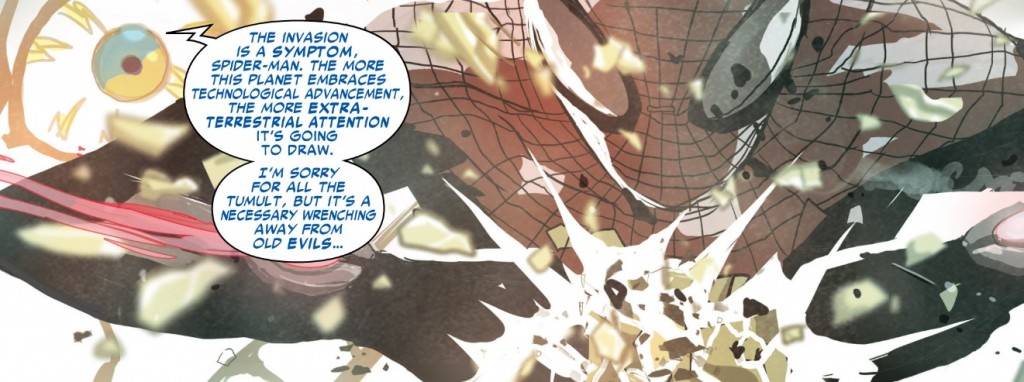

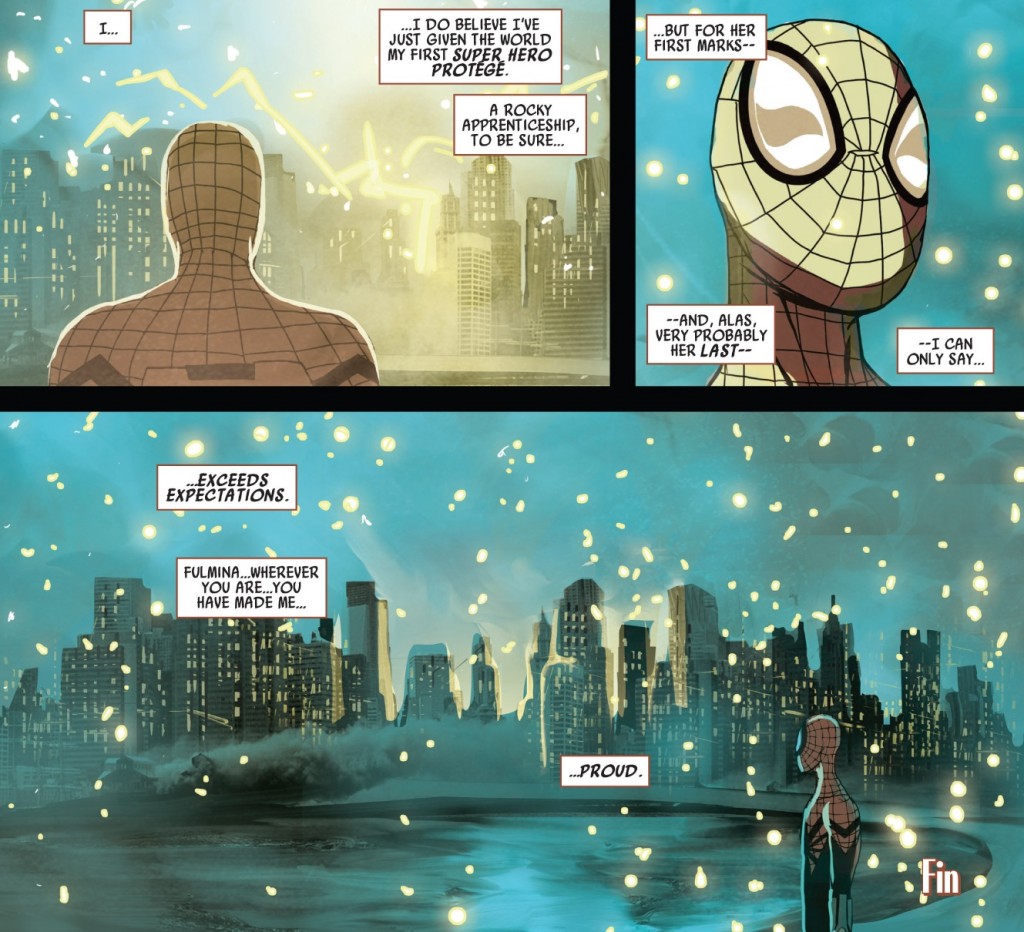
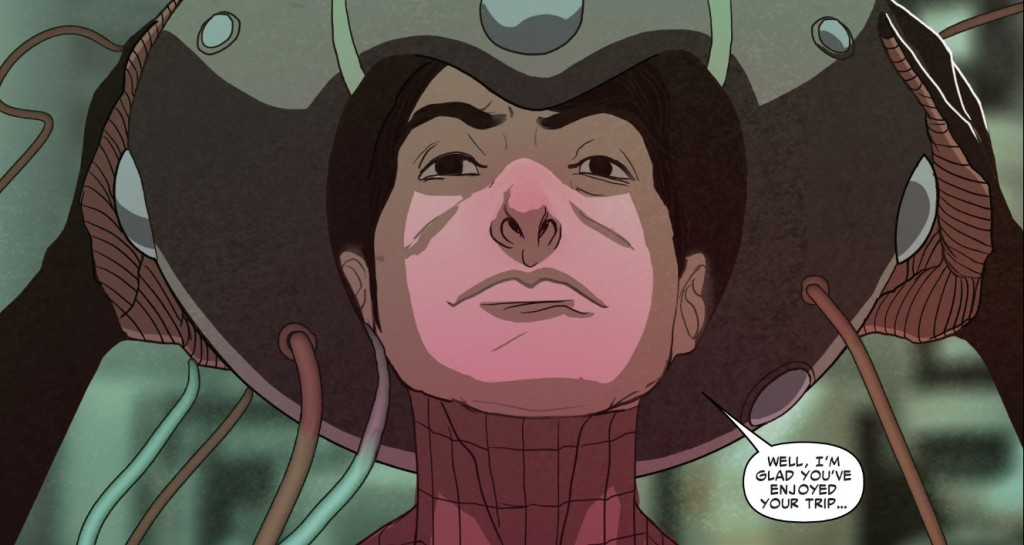

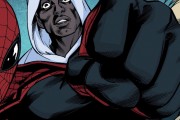

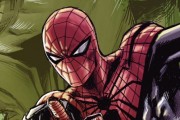
That said, I loved the art. 😉
I’d love to see this guy on the main book. I enjoy him more than Stegman and Cumancoli.
Totally agree, Dan! The style is so quirky and so Spider-Man. I love the subdued colors. It’s almost anime. How can we make this happen?